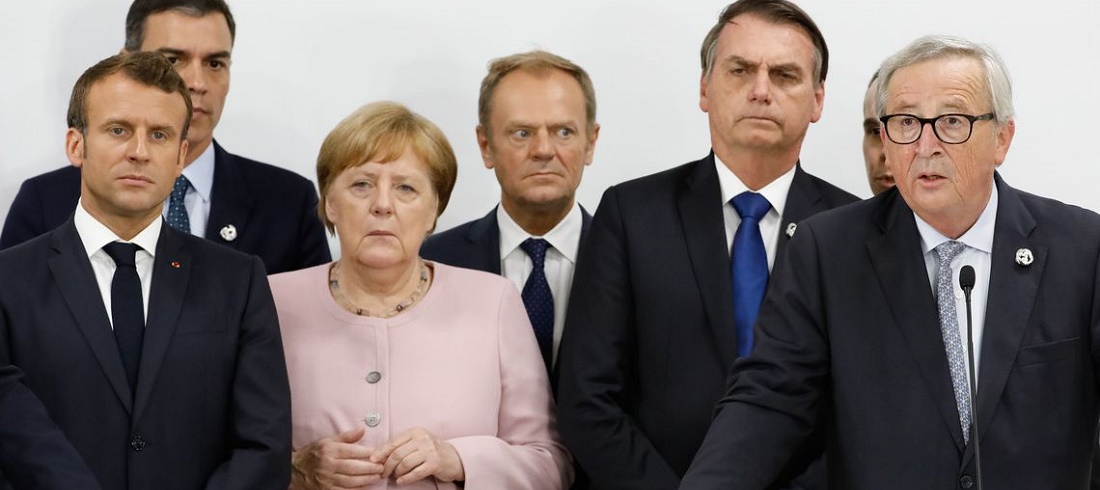
What is already known about the Mercosur-EU agreement
Jul, 01, 2019 Posted by datamarnewsWeek 201927
Brazilian President Jair Bolsonaro said on Sunday (30/06) that it may take up to three years for the free trade agreement between the European Union (EU) and Mercosur to enter into force, as it depends on approvals from legislators of all involved countries.
“The agreement comes into force in one or three years, depending on the parliaments… Ours might be one of the first to approve, I hope,” he told reporters when he arrived in Brasília.
Besides, there is a round of negotiations for the different sectors that remain open and need further discussion.
What does the agreement foresee
– Elimination of tariffs for orange juice, fruits (melons, watermelons, oranges, lemons, and others), soluble coffee, fish, crustaceans, and vegetable oils.
– Brazilian exporters in various sectors will have preferential access (through exclusive quotas and partial tariff reductions): meat (beef, pork, and poultry), sugar, ethanol, rice, eggs, and honey.
– Cachaças, cheeses, wines, and coffees were recognized as distinctive of Brazil. This means that the identity of these products will be protected on European territory.
– The agreement does not foresee the use of special agricultural safeguards, which preserves the interests of Brazilian producers.
– Brazilian companies will have export tariffs eliminated for 100% of industrial products.
– Brazilian companies may participate in bids from the European Union, a market estimated at US$1.6tn.
– Reduced costs and agility in the import, export, and transit of goods.
– Brazilian producers will be able to access high technology inputs with lower prices.
– Consumers will have access to a greater diversity of products at competitive prices.
Effects of the agreement for Brazil
– The Mercosur-EU Agreement will increase Brazil’s GDP by US$87.5bn over 15 years, reaching US$125bn if we consider the reduction of non-tariff barriers and the expected increase in the total productivity of the factors of production. The estimate is from the Ministry of Economy.
– Investments in Brazil, in 15 years, are expected to grow to US$113bn.
– Brazilian exports will have gained almost US$100bn by 2035.
In 2018, Brazil registered trade of US$76bn with the EU and a surplus of US$7bn. Brazilian agricultural exports to the European Union reached US$13.6bn last year. Soybean leads the list ($3.4bn). Imports from Brazil resulted in US$2.2bn, mainly of olive oil (US$362.5m) and wines (US$156.6m) from Europe.
Mercosur-EU
– The European Union is Mercosur’s second trading partner and the first in investment. Mercosur is the EU’s eighth largest non-regional trading partner.
– Mercosur and the EU have a combined market of 780m people. The two blocs together represent a GDP of about $20tn, which is about 25% of the world economy.
– In 2018, the current trade (sum of exports and imports) between Mercosur and the European Union resulted in US$94bn according to international trade statistics.
– In 2017, the EU’s stock of investments in the South American bloc amounted to about $433bn.
To understand the size of this negotiation, the following chart, based on Datamar’s Dataliner data, shows the volume of exports and imports between Mercosur and the European Union.
-
Economy
Jul, 08, 2019
0
EU-Mercosur agreement: Argentina benefits from beef exports
-
Trade Regulations
Jul, 08, 2019
0
Korean government continues negotiations with Mercosur
-
Trade Regulations
Sep, 19, 2019
0
Austria rejects EU-Mercosur agreement
-
Ports and Terminals
Feb, 15, 2019
0
Bolsonaro plans to privatize 10 port areas in the first semester of 2019

